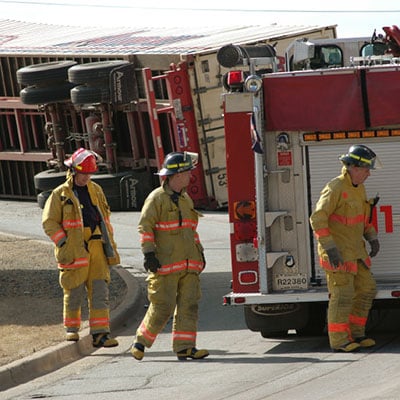

Most people don’t want to share the road with large trucks and 18-wheelers. Over the years, we’ve conducted surveys about why nobody wants to be driving next to an 18-wheeler, and the number one response is that they are afraid of getting hit. The good news is that the number of fatal truck crashes has been decreasing steadily for over a decade. The bad news is that there were still 4,317 fatal truck crashes in the United States in 2016.
That’s why we’re going through the top 5 causes of 18-wheeler wrecks for you. You need to know what to watch out for when you’re sharing the road with a big truck or 18-wheeler:
1. Speeding is the leading cause of truck wrecks.
67% of large truck crashes occur because they are “traveling too fast.” Not only is this statistic staggering, more than 22% of all large-truck drivers involved in fatal crashes in 2016 had at least one prior speeding conviction. Truck drivers are required by federal law to follow all speed limits. So when you realize the truck next to you or in front of you is speeding, it is a sign they have already made the decision to break one federal safety law. You don’t want to know what other laws they’d be willing to break next.
Also, fully-loaded trucks require 20-40% more distance to stop than a regular car. Depending on how fast they were going, the road conditions, and the weight of their load, these trucks can travel nearly 200 feet between the time they apply the brakes and when they come to a full stop.
2. When trucks are poorly maintained, they are more likely to cause a crash.
If it takes 200 feet for a truck with good brakes to come to a full stop, imagine what happens if the truck has bad breaks, a broken axle, or another problem that causes something catastrophic to happen. Some companies put safety first and make sure that their trucks are in perfect condition before every trip. Other companies cut corners and try to save money by not maintaining their trucks.
Even though truck drivers inspect their trucks before every trip and point out issues, their companies may flat-out deny maintenance requests because of the cost. We’ve helped injured truck drivers as well as truck wreck survivors hold their companies accountable for putting profits over the safety of their employees and the public. We have the experience to prove that these companies knew the trucks were unsafe and put them on the road anyway.
3. Distracted drivers and tired drivers cause crashes.
AAA published a study about distracted driving that concluded that any cell phone use roughly quadruples the risk of getting into a wreck. This goes for truck drivers as well. Although federal law prevents truck drivers from using their cell phones while driving, companies don’t always enforce the law. On top of that, cell phones aren’t the only thing that can cause a truck driver to be distracted.
Anything from opening a bottle of water to a bag of chips can be distracting. Anything that takes your eyes and attention away from the road and your hands from the steering wheel can distract you. We helped the family of a local realtor hold a truck driver and company accountable because the truck driver took his eyes off the road to get a can of soda from a cooler and rear-ended the realtor at high speed, killing him.
Tired drivers also cause wrecks. The Federal Motor Carrier Safety Administration allows 18-wheeler drivers to be on the road for 11 hours per day. Demand for truck drivers has stressed some companies to push their drivers past this time limit. Studies show that 13% of truck drivers were fatigued at the time of their crash.
4. Driving under the influence of drugs and alcohol causes truck wrecks.
Driving under the influence of drugs and alcohol seems like an obvious violation of truck safety laws, but it happens more than you think. Some trucking companies will look the other way when hiring drivers and ignore past drug and alcohol violations. 34% of all drunk driving crashes in 2016 involved a drunk truck driver. We have helped survivors of crashes caused by a truck driver who was high on cocaine as well as the survivor of a crash caused by a drunk truck driver. These clients turned to us to help make our roads and communities safer.
5. Lack of training and supervision causes 18-wheeler crashes
Trucking companies are required to train and closely supervise truck drivers. This rule helps keep all of us safe. However, when companies put drivers behind the wheel untrained and unsupervised, we pay the price. These companies think they are saving money by not investing in training and safety. The truth is, they usually wind up having to pay much more to the victims and survivors of 18-wheeler crashes. Juries and communities don’t like it when supposedly “professional” drivers have barely any more training than the rest of us.
What to do if you run into any of these safety failures on the road
If you are sharing the road with an 18-wheeler and feel as if something is wrong, it might be. Drive defensively and drive safely. If you think the truck is a clear and present danger to you and others, pull over and call 9-1-1. If you have a passenger who can safely take a photo of the truck’s license plate, that will help you identify the truck.
If you are hit by an 18-wheeler and believe the wreck was caused by one of these factors, consult an attorney immediately. Trucking companies and their lawyers get to work right away as soon as a wreck happens. They do everything possible to make your claim go away. You need the help of a team of experienced trial lawyers who have a track record of success holding trucking companies accountable for their safety failures. To get started now, call us at 877-724-7800.

